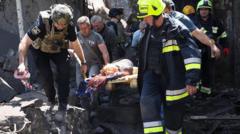A cease-fire between Israel and Iran, brokered by Donald Trump, faces challenges as both countries accuse each other of violations.
**Israel-Iran Cease-Fire Fragile Amid Military Strikes and Political Scandal**

**Israel-Iran Cease-Fire Fragile Amid Military Strikes and Political Scandal**
Tensions boil as President Trump criticizes military actions following fragile cease-fire between Israel and Iran.
---
The cease-fire agreement between Israel and Iran, announced by President Trump on June 24, 2025, is already under severe strain. Just hours after the announcement, missile exchanges resumed, prompting Trump to express his dissatisfaction with both nations for continuing hostilities despite a formal truce. Speaking from Air Force One en route to a NATO summit, Trump highlighted the apparent chaos, remarking, “I’m not happy with Israel. They didn’t have to unload,” referring to Israeli airstrikes that occurred immediately after the cease-fire was declared.
The conflict, which escalated dramatically over 12 days, saw both countries engaging in extensive military operations, resulting in significant civilian casualties. In the hours leading up to the cease-fire, Iranian missile strikes significantly damaged parts of the Israeli city of Beersheba, claiming four lives. In retaliation, Israeli forces targeted military positions near Tehran.
Despite mutual claims of violation surrounding the cease-fire, analysts suggest that both Israel and Iran may be hedging their bets to preserve the fragile peace. Israeli Prime Minister Benjamin Netanyahu stated that Iran had launched missiles after the cease-fire began, while Iran’s military disputed these assertions, maintaining that their missile activities were in response to prior Israeli bombardments.
The diplomatic maneuvering to achieve the cease-fire included intervention by Qatari officials who facilitated discussions between the two adversaries. Qatar's unique position in the Arab Gulf, marked by its ability to negotiate with Iran unlike many of its neighbors, has been pivotal in securing a temporary halt to hostilities.
Global reactions have been mixed, with world leaders expressing cautious optimism regarding the peace initiative. The situation remains volatile, as both nations reflect on the ramifications of their actions while navigating their national interests and public opinions amid a backdrop of escalating tensions in the region.
Furthermore, the political landscape in the United States is also contentious, with calls from some lawmakers beginning to surface for Trump’s impeachment due to his handling of military engagements in the Middle East without Congressional approval. As the diplomatic, military, and political stakes continue to rise, observers remain cautiously vigilant about the prospects for lasting peace in a historically fraught region.
The cease-fire agreement between Israel and Iran, announced by President Trump on June 24, 2025, is already under severe strain. Just hours after the announcement, missile exchanges resumed, prompting Trump to express his dissatisfaction with both nations for continuing hostilities despite a formal truce. Speaking from Air Force One en route to a NATO summit, Trump highlighted the apparent chaos, remarking, “I’m not happy with Israel. They didn’t have to unload,” referring to Israeli airstrikes that occurred immediately after the cease-fire was declared.
The conflict, which escalated dramatically over 12 days, saw both countries engaging in extensive military operations, resulting in significant civilian casualties. In the hours leading up to the cease-fire, Iranian missile strikes significantly damaged parts of the Israeli city of Beersheba, claiming four lives. In retaliation, Israeli forces targeted military positions near Tehran.
Despite mutual claims of violation surrounding the cease-fire, analysts suggest that both Israel and Iran may be hedging their bets to preserve the fragile peace. Israeli Prime Minister Benjamin Netanyahu stated that Iran had launched missiles after the cease-fire began, while Iran’s military disputed these assertions, maintaining that their missile activities were in response to prior Israeli bombardments.
The diplomatic maneuvering to achieve the cease-fire included intervention by Qatari officials who facilitated discussions between the two adversaries. Qatar's unique position in the Arab Gulf, marked by its ability to negotiate with Iran unlike many of its neighbors, has been pivotal in securing a temporary halt to hostilities.
Global reactions have been mixed, with world leaders expressing cautious optimism regarding the peace initiative. The situation remains volatile, as both nations reflect on the ramifications of their actions while navigating their national interests and public opinions amid a backdrop of escalating tensions in the region.
Furthermore, the political landscape in the United States is also contentious, with calls from some lawmakers beginning to surface for Trump’s impeachment due to his handling of military engagements in the Middle East without Congressional approval. As the diplomatic, military, and political stakes continue to rise, observers remain cautiously vigilant about the prospects for lasting peace in a historically fraught region.























